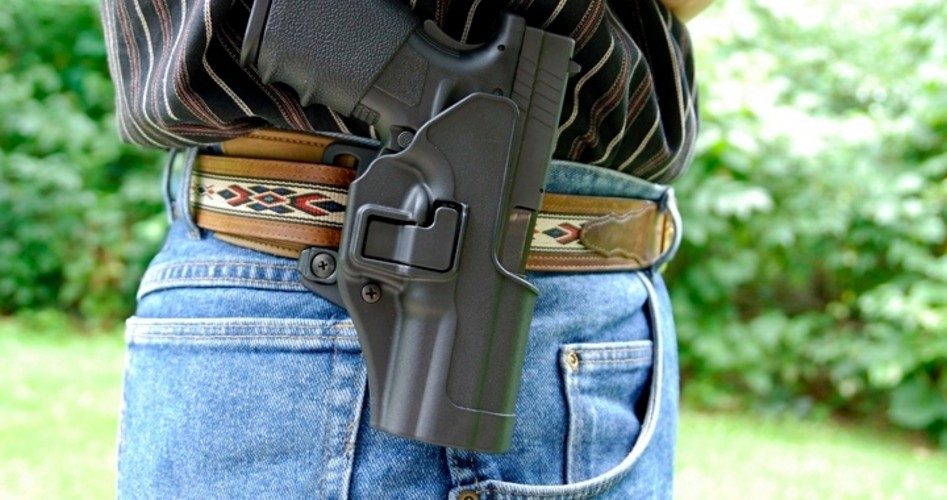
Georgia Governor Nathan Deal signed into law Wednesday a bill the National Rifle Association has called “the most comprehensive pro-gun reform legislation introduced in recent history” and critics have labeled the “‘guns everywhere’ bill.”
The new law, effective July 1, allows licensed gun owners to bring guns into bars and government buildings that don’t have metal detectors, including city halls, libraries, recreational centers, city office buildings, and fire stations, USA Today reported. The “Safe Carry Protection Act” also allows school districts to permit some employees to be armed in schools. It gives religious leaders the option of allowing licensed gun owners to carry their firearms into their respective churches, synagogues, or mosques and will allow people to carry guns.
The new legislation also removes a restriction preventing people convicted of certain misdemeanors from getting a gun permit and, in a provision that has caused some concern among law enforcement officials, police will not be able to detain a person “for the sole purpose of investigating whether such a person has a weapons carry license.”
“Our state has some of the best protections for gun owners in the United States. And today we strengthen those rights protected by our nation’s most revered founding document,” Deal, a Republican, said in a bill-signing ceremony at the edge of the Chattahoochee National Forest in Ellijay, a site he chose because it is in the district of Speaker David Ralston, who worked for passage of the measure in the state House of Representatives.
Jerry Henry, executive director of the gun rights group GeorgiaCarry.Org, hailed the new law as a measure that will “restore our right to carry and [we will] be allowed to protect ourselves anywhere we go.”
Others emphatically denounced the measure, enacted after impassioned debate. Organizations opposing the bill included Americans for Responsible Solutions, co-founded by former congresswoman Gabrielle Giffords, (D-Ariz.), who was seriously injured in a shooting spree that left six dead and 13 wounded at a Tucson shopping center in January, 2011. The group called the legislation the nation’s most extreme gun bill and claimed it “moves Georgia out of the mainstream.” Lucia McBath, national spokeswoman for Moms Demand Action for Gun Sense in America, called it “a very, very dangerous kill bill.” McBath’s 17-year-old son, Jordan Davis, was killed in November 2012 in Jacksonville, Florida, in a dispute over loud music.
The Georgia Municipal Association, representing the state’s 538 cities, sent a letter to Deal asking him to veto the legislation, in which the group insisted,
Local elected officials are responsible for securing and maintaining public safety, and insurance coverage, in buildings owned and operated by the city. Therefore, they should have the authority to make a decision about whether to allow weapons in such buildings.
A series of mass shootings at schools, movie theaters, churches, and shopping centers in recent years has renewed debate over whether guns in public places endanger the public or make it safer by giving potential victims the opportunity to defend themselves by firing back at a would-be killer. Advocates of greater gun freedom have pointed out that the mass killings have all taken place in venues where guns are prohibited, giving the mentally deranged killers plenty of time to dispatch a number of victims before either killing themselves or being killed by police when they arrive.
Last year a gunman in Suwanee, Georgia, faked a heart attack and took five unarmed Gwinnett County firefighters hostage at gunpoint in his home. After a four-hour standoff, a SWAT team killed the gunman and rescued the hostages, but some Georgia legislators believe the incident sparked support for the bill Deal signed Wednesday, USA Today reported. The bill had failed in three previous legislative sessions but passed late on the night of March 20, the session’s final day this year.
The Second Amendment to the U.S. Constitution states: “A well regulated militia, being necessary to the security of a free State, the right of the people to keep and bear Arms, shall not be infringed.” Gun control advocates have long argued that the wording of the Amendment limits the right to state militias, but in 2008, the U.S. Supreme Court, in Heller v. District of Columbia, ruled the right to bear arms belongs to individuals, but said it could still be subject to local restrictions.
In a new book proposing constitutional reforms, retired Justice John Paul Stevens advocates limiting the right to bear arms by adding to the Second Amendment the words, “when serving in the Militia.” The Second Amendment was written at a time when nearly every able-bodies adult male served in a militia. In the words of Patrick Henry, “The great object is, that every man be armed.”



